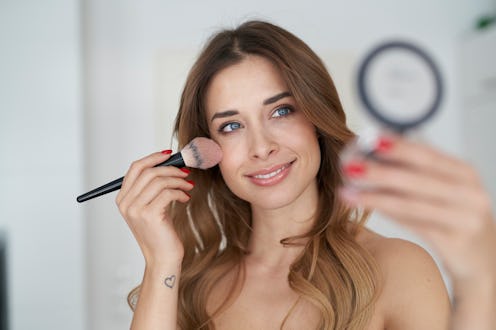Life
Watch Out For These Comments About Your Appearance

It's safe to say most people agree that trolls are The Worst, capitals included, but it's especially true of the variety that pretends to be on your side as they slowly chip away at your self-esteem. These concern trolls, as they're known online, can pop up in pretty much any avenue of conversation, but concern trolling comments about your appearance are some of the most common. Unfortunately, this doesn't mean they're easy to spot; part of the insidious nature of concern trolling is that it comes from a place of support — at least, on the surface. The trouble is that this support isn't actually genuine.
For those who haven't come across the term before, a concern troll is someone who claims to be on one side of a discussion, but they need to address some "concerns" before they fully support it. For instance, someone could troll feminists by saying they support gender equality, but they simply can't ally themselves with the feminist movement because it doesn't make enough efforts to include men. (Spoiler alert: Feminism absolutely includes men.) In short, concern trolls use the pretense of worrying about something to justify criticisms. Of course, any side of a discussion could probably use some criticism, but it becomes a problem when concern trolls refuse to participate in discussion beyond stirring up discontent.
Concern trolling frequently turns up in political discussions, but it can be seen in other areas of life as well — especially when it comes to appearance. After all, society places an enormous value on the physical, especially in women, and we're taught from birth to point out any deviations from what society deems the norm. The worst part? Concern trolls don't always know that they're, well, trolling; even people who make an effort to be inclusive might put someone down without realizing that they're reinforcing strict cultural beauty standards.
Concern trolling began as a term to describe online behavior, but it's actually a fairly common tactic in real life as well. In the past, Bustle has covered ways people question your health and occupation, but today's topic of discussion is one of the most common forms of concern trolling: Policing people's appearances. Let's take a look at five examples of comments to watch out for.
1. "Have you put on a little weight? You know, obesity is linked to heart disease."
To be fair, most people probably aren't as blatant about concern-trolling as the example comment above, but the sentiment is often there. In a society that prizes slenderness, fat-shaming is one of the most common forms of concern-trolling. Of course, there are a number of other factors that are important to your health that have nothing to do with weight, but concern trolls tend to zero in on the health aspect to justify their criticisms. They don't have a problem with fat people (supposedly); they just worry about them.
2. "You look so tired. Do you want to borrow some makeup?"
...Thanks? Makeup is great, but nobody should feel like they have to wear it all the time — and comments like this just perpetuate the idea that everyone has to look perfectly put-together all the time.
3. "I just wanted to make sure you know you can see your cellulite in that."
Oh my goodness, WHAT? You mean you can actually see evidence of humanity? Cellulite is a perfectly normal condition that happens to both men and women, though women tend to experience it more often. Although these dimply fat deposits occur in an estimated 90 percent of women, society's inflexible standards of beauty consider it undesirable, and as a result, we unconsciously learn to look for it in other people. Even if it's done unconsciously, trying to "improve" someone's appearance by pointing out things like cellulite just perpetuates impossible beauty ideals. Besides, it's totally rude.
4. "Those really aren't the right glasses for your face shape."
Any time someone tries to tell you to wear the "right" styles, run far away, because — spoiler alert! — there are no correct styles in the first place. Fashion is about the person wearing the clothes, not some arbitrary style dictated by the whims of society, and if you want to wear something, go for it. If someone tries to make you feel bad about yourself for your sense of fashion, they're probably not worth hanging around in the first place.
5. "You'd look so much taller/prettier/slimmer if you wore the right clothes."
Clothes shouldn't be about "fixing" your body to emulate whatever ideal is en vogue at the time. For one thing, those standards are completely subjective, and for another, our unique attributes are what make us interesting. So I don't know about you, but I'll happily wear capris when I feel like it — yes, I'm aware that they make me look short. This just in: It's because I am short. Isn't it weird how that works?
Images: Westend61/Westend61/Getty Images, Giphy